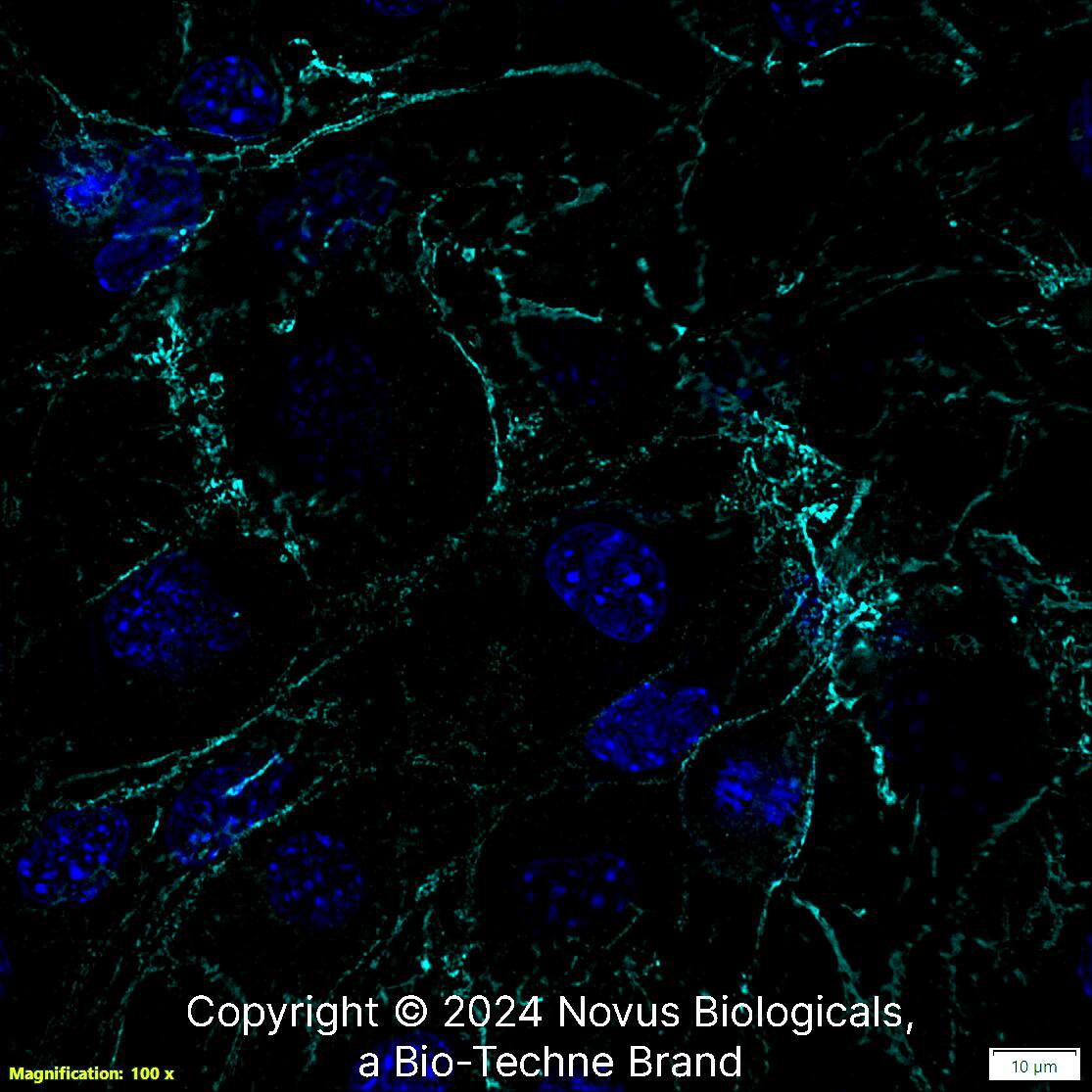CD31/PECAM-1 Antibody (MEC 7.46) - BSA Free
Novus Biologicals, part of Bio-Techne | Catalog # NB100-1642

![Immunocytochemistry/ Immunofluorescence: CD31/PECAM-1 Antibody (MEC 7.46) [NB100-1642] Immunocytochemistry/ Immunofluorescence: CD31/PECAM-1 Antibody (MEC 7.46) [NB100-1642]](https://resources.bio-techne.com/images/products/CD31-PECAM-1-Antibody-MEC-7-46-Immunocytochemistry-Immunofluorescence-NB100-1642-img0014.jpg)
Conjugate
Catalog #
Forumulation
Catalog #
Key Product Details
Validated by
Knockout/Knockdown
Species Reactivity
Validated:
Mouse
Cited:
Mouse
Applications
Validated:
Flow (Cell Surface), Flow Cytometry, Immunocytochemistry/ Immunofluorescence, Immunohistochemistry, Immunohistochemistry-Frozen, Immunohistochemistry-Paraffin, Immunoprecipitation, In vivo assay
Cited:
Flow Cytometry, IF/IHC, Immunocytochemistry/ Immunofluorescence, Immunohistochemistry, Immunohistochemistry-Frozen, Immunohistochemistry-Paraffin, In vivo assay
Label
Unconjugated
Antibody Source
Monoclonal Rat IgG1 Clone # MEC 7.46
Format
BSA Free
Concentration
1 mg/ml
Product Specifications
Immunogen
This CD31/PECAM-1 Antibody (MEC 7.46) was developed against mouse endothelial cell line T-end.
Localization
Membrane; Single-pass type I membrane protein. Cell junction.
Clonality
Monoclonal
Host
Rat
Isotype
IgG1
Theoretical MW
82.5 kDa.
Disclaimer note: The observed molecular weight of the protein may vary from the listed predicted molecular weight due to post translational modifications, post translation cleavages, relative charges, and other experimental factors.
Disclaimer note: The observed molecular weight of the protein may vary from the listed predicted molecular weight due to post translational modifications, post translation cleavages, relative charges, and other experimental factors.
Scientific Data Images for CD31/PECAM-1 Antibody (MEC 7.46) - BSA Free
Immunocytochemistry/ Immunofluorescence: CD31/PECAM-1 Antibody (MEC 7.46) [NB100-1642]
Immunocytochemistry/Immunofluorescence: CD31/PECAM-1 Antibody (MEC 7.46) [NB100-1642] - Mouse MS1 cells were fixed in 4% paraformaldehyde for 10 minutes and permeabilized in 0.05% Triton X-100 in PBS for 5 minutes. The cells were incubated with CD31/PECAM-1 Antibody [MEC 7.46] (NB100-1642) at 1ug/ml overnight at 4C and detected with an anti-rat DyLight 488 (Green) at a 1:1000 dilution for 60 minutes. Nuclei were counterstained with DAPI (Blue). Cells were imaged using a 100X objective and digitally deconvolved.Flow (Cell Surface): CD31/PECAM-1 Antibody (MEC 7.46) [NB100-1642]
Flow (Cell Surface): CD31/PECAM-1 Antibody (MEC 7.46) [NB100-1642] - A surface stain was performed on MS-1 Cells with CD31/PECAM-1 Antibody (MEC 7.46) NB100-1642(blue) and a matched isotype control (orange). Cells were incubated in an antibody dilution of 2.5 ug/mL for 20 minutes at room temperature, followed by rat F(ab)2 IgG (H+L) APC-conjugated secondary antibody (F0113, R&D Systems).Immunohistochemistry: CD31/PECAM-1 Antibody (MEC 7.46) [NB100-1642]
Immunohistochemistry: CD31/PECAM-1 Antibody (MEC 7.46) [NB100-1642] - Immunohistochemistry for vessel staining (CD31) and beta-amyloid comparing 13- and 24-month old arcAbeta mice. Overviews (scale bars = 200 um) of the corpus callosum (CC), thalamus (TH), and cerebellum (CB). Insets show the regions with higher magnification (scale bar = 50 um). Image collected and cropped by CiteAb from the following publication (https://journal.frontiersin.org/Article/10.3389/fnagi.2015.00241/abstract), licensed under a CC-BY license.Applications for CD31/PECAM-1 Antibody (MEC 7.46) - BSA Free
Application
Recommended Usage
Flow Cytometry
1:10-1:1000
Immunocytochemistry/ Immunofluorescence
1:100-1:500
Immunohistochemistry
1:100-1:500
Immunohistochemistry-Frozen
1:100-1:500
Immunohistochemistry-Paraffin
1:10-1:500. Use reported in scientific literature (PMID 25525387)
Immunoprecipitation
1:10-1:500
In vivo assay
reported in scientific literature (PMID 10544206)
Formulation, Preparation, and Storage
Purification
Protein G purified
Formulation
PBS
Format
BSA Free
Preservative
0.05% Sodium Azide
Concentration
1 mg/ml
Shipping
The product is shipped with polar packs. Upon receipt, store it immediately at the temperature recommended below.
Stability & Storage
Store at 4C short term. Aliquot and store at -20C long term. Avoid freeze-thaw cycles.
Background: CD31/PECAM-1
PECAM's intracellular cytoplasmic domain consists of a sequence of 118 amino acids and contains serine and tyrosine (also referred to as immunoreceptor tyrosine-based inhibitory motifs-ITIMs) residues, which may be phosphorylated upon cellular stimulation (3). ITIMs are phosphorylated by Src-family kinases and non-Src family kinases (e.g., Csk), leading to a conformational change which supports interactions with Src homology 2 (SH2) domain containing proteins such as protein-tyrosine phosphatase, SHP-2 (1,2). Formation of SHP-2/PECAM-1 complexes induces endothelial cell migration through the dephosphorylation of focal adhesion kinase and regulation of RhoA activity (1). Signaling downstream of ITIM tyrosine phosphorylations also plays a role in PECAM's anti-apoptotic activity, a function which is independent of its interaction with SHP-2. In platelets and leukocytes, phosphorylation of PECAM's cytosolic domain is inhibitory, preventing their activation.
References
1. Lertkiatmongkol, P., Liao, D., Mei, H., Hu, Y., & Newman, P. J. (2016). Endothelial functions of PECAM-1 (CD31). Current Opinion in Hematology. https://doi.org/10.1097/MOH.0000000000000239.Endothelial
2. Privratsky, J. R., & Newman, P. J. (2014). PECAM-1: Regulator of endothelial junctional integrity. Cell and Tissue Research. https://doi.org/10.1007/s00441-013-1779-3
3. Newman, P. J., & Newman, D. K. (2003). Signal transduction pathways mediated by PECAM-1: New roles for an old molecule in platelet and vascular cell biology. Arteriosclerosis, Thrombosis, and Vascular Biology. https://doi.org/10.1161/01.ATV.0000071347.69358.D9
Long Name
Platelet Endothelial Cell Adhesion Molecule 1
Alternate Names
CD31, EndoCAM, PECA1, PECAM-1, PECAM1, anti-CD31, MEC 7.46 cd31, MEC 7.46 clone
Entrez Gene IDs
18613 (Mouse)
Gene Symbol
PECAM1
UniProt
Additional CD31/PECAM-1 Products
Product Documents for CD31/PECAM-1 Antibody (MEC 7.46) - BSA Free
Product Specific Notices for CD31/PECAM-1 Antibody (MEC 7.46) - BSA Free
This product is for research use only and is not approved for use in humans or in clinical diagnosis. Primary Antibodies are guaranteed for 1 year from date of receipt.
Loading...
Loading...
Loading...
Loading...
Loading...
![Flow (Cell Surface): CD31/PECAM-1 Antibody (MEC 7.46) [NB100-1642] Flow (Cell Surface): CD31/PECAM-1 Antibody (MEC 7.46) [NB100-1642]](https://resources.bio-techne.com/images/products/CD31-PECAM-1-Antibody-MEC-7-46-Flow-Cell-Surface-NB100-1642-img0005.jpg)
![Immunohistochemistry: CD31/PECAM-1 Antibody (MEC 7.46) [NB100-1642] Immunohistochemistry: CD31/PECAM-1 Antibody (MEC 7.46) [NB100-1642]](https://resources.bio-techne.com/images/products/CD31-PECAM-1-Antibody-MEC-7-46-Immunohistochemistry-NB100-1642-img0011.jpg)
![Immunocytochemistry/ Immunofluorescence: CD31/PECAM-1 Antibody (MEC 7.46) [NB100-1642] Immunocytochemistry/ Immunofluorescence: CD31/PECAM-1 Antibody (MEC 7.46) [NB100-1642]](https://resources.bio-techne.com/images/products/CD31-PECAM-1-Antibody-MEC-7-46-Immunocytochemistry-Immunofluorescence-NB100-1642-img0013.jpg)
![Immunocytochemistry/ Immunofluorescence: CD31/PECAM-1 Antibody (MEC 7.46) [NB100-1642] Immunocytochemistry/ Immunofluorescence: CD31/PECAM-1 Antibody (MEC 7.46) [NB100-1642]](https://resources.bio-techne.com/images/products/CD31-PECAM-1-Antibody-MEC-7-46-Immunocytochemistry-Immunofluorescence-NB100-1642-img0002.jpg)
![Immunocytochemistry/ Immunofluorescence: CD31/PECAM-1 Antibody (MEC 7.46) [NB100-1642] Immunocytochemistry/ Immunofluorescence: CD31/PECAM-1 Antibody (MEC 7.46) [NB100-1642]](https://resources.bio-techne.com/images/products/CD31-PECAM-1-Antibody-MEC-7-46-Immunocytochemistry-Immunofluorescence-NB100-1642-img0016.jpg)
![Immunohistochemistry-Frozen: CD31/PECAM-1 Antibody (MEC 7.46) [NB100-1642] Immunohistochemistry-Frozen: CD31/PECAM-1 Antibody (MEC 7.46) [NB100-1642]](https://resources.bio-techne.com/images/products/CD31-PECAM-1-Antibody-MEC-7-46-Immunocytochemistry-Immunofluorescence-NB100-1642-img0012.jpg)
![Flow Cytometry: CD31/PECAM-1 Antibody (MEC 7.46) [NB100-1642] Flow Cytometry: CD31/PECAM-1 Antibody (MEC 7.46) [NB100-1642]](https://resources.bio-techne.com/images/products/CD31-PECAM-1-Antibody-MEC-7-46-Flow-Cytometry-NB100-1642-img0015.jpg)
![Immunohistochemistry: CD31/PECAM-1 Antibody (MEC 7.46) [NB100-1642] Immunohistochemistry: CD31/PECAM-1 Antibody (MEC 7.46) [NB100-1642]](https://resources.bio-techne.com/images/products/CD31-PECAM-1-Antibody-MEC-7-46-Immunohistochemistry-NB100-1642-img0010.jpg)
![Flow Cytometry: CD31/PECAM-1 Antibody (MEC 7.46) [NB100-1642] Flow Cytometry: CD31/PECAM-1 Antibody (MEC 7.46) [NB100-1642]](https://resources.bio-techne.com/images/products/CD31-PECAM-1-Antibody-MEC-7-46-Flow-Cytometry-NB100-1642-img0006.jpg)
